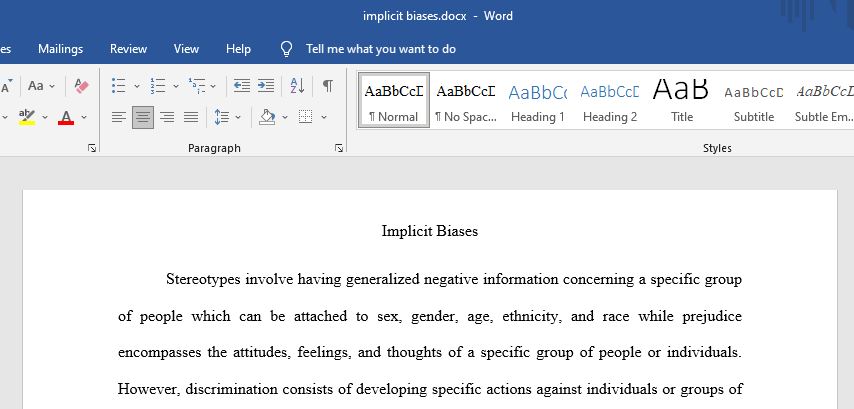Psychology Question- Implicit Biases
GOAL:
To explore your own implicit biases and how this may influence stereotyping and prejudice, as well as discuss your own lived experiences.
Remember- we ALL have implicit biases- and sometimes even explicit biases that come out in the form of prejudice or discrimination. This is going to be a conversation that might make you uncomfortable as the topic is often not discussed with family/friends. Please respect everyone’s lived experiences. Remember, if we don’t talk about these things and educate ourselves about how implicit and explicit biases work, we won’t be able to reduce these behaviors. Knowledge IS power.
Instructions
- Please watch the following videos:
- This video on the danger of a single story (Links to an external site.)
- This video on overcoming our own biases (Links to an external site.)
- In your OWN words, what is the difference between a stereotype, prejudice, and discrimination? Provide an example either from the videos or in your own personal life (something that may have happened to you OR you were prejudiced towards a particular individual/group) of prejudice stereotyping, and discrimination.
- What is the danger of a single story? What does viewing someone based solely on their membership in a specific group often lead to?
- What are 2 historical examples of prejudice and discrimination?
- What is a current example of prejudice/discrimination? FIND A RECENT ARTICLE (past year) and copy the URL here. Summarize the article in 3-4 sentences and discuss how it relates to the textbook and videos.
- What is your understanding of privilege? Discuss a time when you have experienced privilege and might not have known it. HINT: Privilege is more than race/ethnicity. While it is true white privilege exists, there are so many other examples as well, including having parents who are still married, having your own car, being able to pay bills every month and save some money.
- Racism, sexism, prejudice, and discrimination are pervasive within our social structures and often perpetuate oppression and inequality. What are some ways we can reduce implicit biases, prejudice and discrimination? In 3- 5 sentences, provide some concrete examples of strategies e can use to educate people about prejudice and ways to reduce it.
Requirements: OTHER | Discussion | 1 pages, Double spaced
Answer preview:

word limit:550
